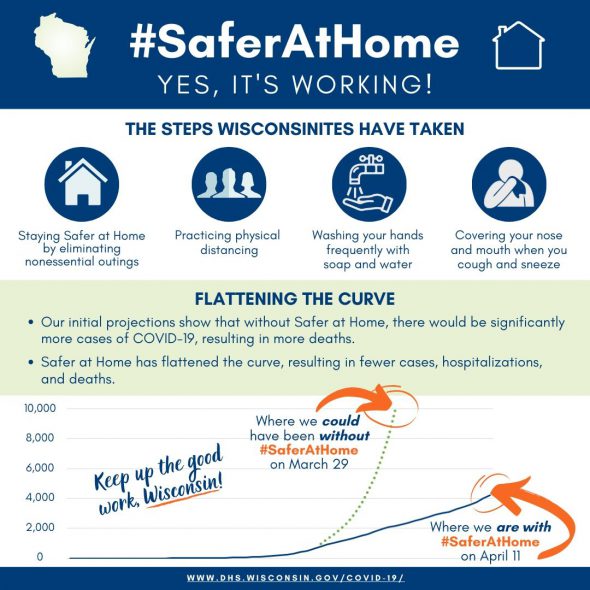COVID-19: Safer at Home is Working
Keep up the good work, Wisconsin!
People across the state of Wisconsin have risen to the challenge of COVID-19 by changing the way they work, play, and interact with friends and family. By staying Safer at Home, practicing physical distancing, and continuing to wash hands and cover coughs, Wisconsinites are making a difference and beginning to flatten the curve.
According to the model created by DHS, Wisconsin was projected to have 22,000 infections by April 8, which would have ultimately resulted in somewhere between 440 and 1,500 deaths. These numbers were based on projected significant exponential growth in positive cases; however, since the Safer at Home order, there has been a decrease in exponential growth in the number of cases. Wisconsin’s rate of doubling of infections was 3.4 days in early March and, over the past two weeks, the rate of doubling is now approximately 12 days.
“Without effective treatments or a vaccine, the only way to slow the spread of COVID-19 is through non-pharmaceutical interventions that help us maintain physical distancing,” said Chief Medical Officer and State Epidemiologist Dr. Ryan Westergaard. “The Safer at Home order has been our main intervention in Wisconsin, and we are beginning to see the results.”
“Limiting physical contact between people is our only tool at slowing the spread of this virus,” explained Secretary-Designee Andrea Palm. “We will continue to work through our statewide response to develop capacity to implement effective containment strategies across the state. These are critical next steps to prevent a future surge of cases.”
By staying Safer at Home, the people of Wisconsin are taking the steps needed to make a difference during this pandemic. Safer at Home is working, and it is saving lives.
For up-to-date information about Wisconsin’s COVID-19 response, visit the DHS COVID-19 webpage. We encourage you to follow @DHSWI on Facebook, Twitter, or dhs.wi on Instagram for more information on COVID-19.
NOTE: This press release was submitted to Urban Milwaukee and was not written by an Urban Milwaukee writer. While it is believed to be reliable, Urban Milwaukee does not guarantee its accuracy or completeness.
More about the Coronavirus Pandemic
- Governors Tony Evers, JB Pritzker, Tim Walz, and Gretchen Whitmer Issue a Joint Statement Concerning Reports that Donald Trump Gave Russian Dictator Putin American COVID-19 Supplies - Gov. Tony Evers - Oct 11th, 2024
- MHD Release: Milwaukee Health Department Launches COVID-19 Wastewater Testing Dashboard - City of Milwaukee Health Department - Jan 23rd, 2024
- Milwaukee County Announces New Policies Related to COVID-19 Pandemic - County Executive David Crowley - May 9th, 2023
- DHS Details End of Emergency COVID-19 Response - Wisconsin Department of Health Services - Apr 26th, 2023
- Milwaukee Health Department Announces Upcoming Changes to COVID-19 Services - City of Milwaukee Health Department - Mar 17th, 2023
- Fitzgerald Applauds Passage of COVID-19 Origin Act - U.S. Rep. Scott Fitzgerald - Mar 10th, 2023
- DHS Expands Free COVID-19 Testing Program - Wisconsin Department of Health Services - Feb 10th, 2023
- MKE County: COVID-19 Hospitalizations Rising - Graham Kilmer - Jan 16th, 2023
- Not Enough Getting Bivalent Booster Shots, State Health Officials Warn - Gaby Vinick - Dec 26th, 2022
- Nearly All Wisconsinites Age 6 Months and Older Now Eligible for Updated COVID-19 Vaccine - Wisconsin Department of Health Services - Dec 15th, 2022
Read more about Coronavirus Pandemic here
Mentioned in This Press Release
Recent Press Releases by Wisconsin Department of Health Services
DHS Highlights Impact of Federal SNAP Changes on Wisconsinites
May 22nd, 2025 by Wisconsin Department of Health ServicesProposed changes to SNAP will cost taxpayers $314 million per year and put 90,000 people at risk of losing benefits
DHS Campaign Increases Awareness of Wisconsin’s Aging and Disability Resource Centers
May 15th, 2025 by Wisconsin Department of Health ServicesNew toll-free phone hotline and resource directory make finding resources and services easier statewide






















